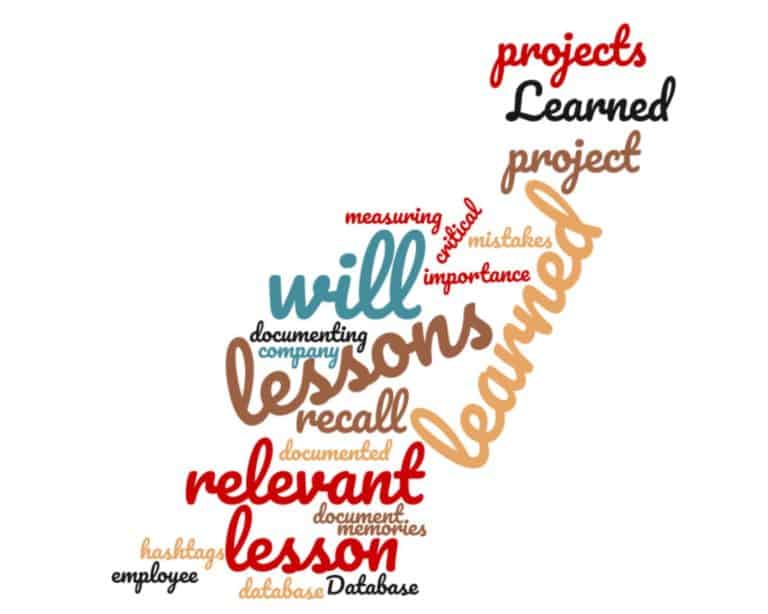
Everyone in industry talks about “lessons learned” and are quick to remind each other of the importance of documenting those lessons and keeping them tucked away for the next go around. When the surface of the topic is scratched however, it becomes obvious in many cases that ‘lessons learned’ is a catchphrase with little meat on the bone. Answers to what these important lessons are, and how they are supposed to be documented is often fuzzy, and even more dubious is how these lessons will resurface when a similar situation presents itself again.
Let’s start by defining a “lesson learned” as any explainable situation in the course of a process or project that has an unanticipated (positive or negative) impact in the realization.
For example, when buying your first refrigerator, the importance of measuring the kitchen space is critical and obvious. However, measuring the door of your home to ensure you can bring the appliance into the kitchen may get forgotten in the excitement of shopping.
After pulling the front door off the hinges, disassembling part of the refrigerator or pondering multi-dimensional physics for an afternoon, it is unlikely the entry-way measurements will be left off in future shopping trips, and can be called a lesson learned.
The human mind will file away a lesson and store it for future recall, then with no apparent prompt, can bring that memory up when it is most relevant and needed again. Unfortunately, organizational memories are rarely so elegant or effective. It’s often left to the individuals in an organization to recall the things that go right or wrong in a given project and apply them to future projects. This approach can be effective in limited situations however it often leads to ‘tribal knowledge’ and serious brain-drain when an experienced long-time employee leaves the organization, dooming your team to repeat mistakes that have already been paid for. The typical answer to this issue is a Lessons Learned Database. This is usually executed as a simple one-level database that often devolves to a list of well-intentioned statements about projects. Sadly, documenting lessons learned does not equate to applying them.
To properly apply lessons learned, they must not only be documented but also retrievable at the relevant place and time, by anyone in the organization, without prior knowledge there is a lesson relevant to the circumstance. This isn’t a small order. Successful recall of lessons learned is most frequently found in organizations with the wisdom to pair a “Lessons Learned Database” with a risk assessment or project kick-off document. Quality document requirements like these will drive a group of decision makers to review a list of lessons, and with experience and clever sorting (or good memories) this may be all it takes to recall and apply lessons that will save the company both time and money.
In addition to the application of new project processes that require process review, there are a few emerging technological solutions that may also present opportunities. Since the arrival of Twitter, the use of ‘hashtags’ has grown in popularity. Don’t discredit them as tech-speak or assume their application is limited to use in social media. Many existing databases (including systems built on a SharePoint platform) can append tags to a database entry. This allows a company to tag any issue, discovery or resolution with #lessonlearned as well as other relevant qualifiers like #shipping or #precisionmachine.
These tags become searchable entries that can help to narrow and filter a broad pool of results down to a very concentrated return of relevant information about similar past undertakings. The use of tags can become a sort of institutional memory that completes the three-part cycle of learning a lesson, remembering it long enough to benefit and recalling it at the critical moment when it can be most beneficial.
We have moved past simple Lesson Learned Databases, these are an artifact of the past that was mostly fiction we sold ourselves encompassing a hope that we will magically remember the important things when the time comes.
Technology and some basic process steps can turn what may have been a meaningless list of observations about past projects into a relevant guide to prevent making the same mistake twice. The implementation of quality-processes and supporting technology like hashtags certainly has a learning curve and the cost is not always clear at the onset. However, in nearly every circumstance, the cost to implement tagging will be lower than the alternative of making the same mistakes over and over or losing important knowledge along with an important employee.
Take the time to consider the value of implementing institutional knowledgebases that are achievable and effective; the cost/benefit is clear.
Contact Keller Technology today to learn more about possible solutions to your most challenging manufacturing problems.
